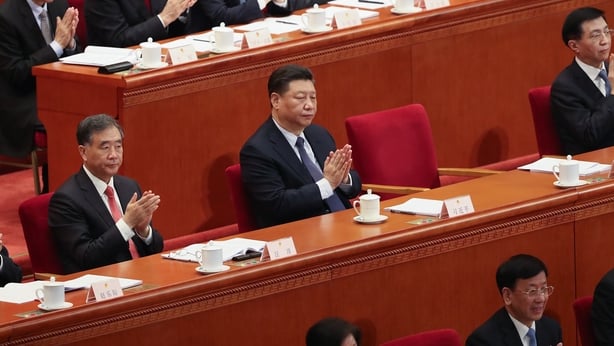By Yvonne Murray in Beijing
China’s annual gathering of lawmakers, the National People’s Congress, got under way in Beijing today.
Around 3,000 delegates from across China come to the city every year to rubber stamp the legislation of China’s ruling communist party.
The morning began in a thick cloud of smog. The clear, blue skies that usually hail the opening of China’s set political events were late this year. The mood inside the Great Hall of the People was not all that sunny either.
Premier Li Keqiang took to the podium to deliver his 'work report', stopping occasionally to wipe his brow and drink from his cup of green tea.
He set China’s gross domestic product (GDP) growth rate target at 6-6.5% - the lowest in almost three decades.
"Downward pressure on the Chinese economy continues to increase, growth in consumption is slowing, and growth in effective investment lacks momentum," Mr Li said.
"Our capacity for innovation is not strong," he added bluntly, "and our weakness in terms of core technologies for key fields remain a salient problem".
Improving China’s innovation sector has been a long-held goal of the government.
But this year there was no mention of the ‘Made-in-China 2025’ strategy by name, a plan to upgrade manufacturing in the high-tech sectors - such as artificial intelligence (AI), robotics and microchips - which has become controversial abroad.
Some European countries as well as the United States are concerned the strategy threatens their own technology industries, which is why ‘forced technology transfer’ is such a major flashpoint in the ongoing US-China trade war.
The US accuses China of unfair trade practices by obliging foreign enterprises doing business in China to enter into joint ventures with Chinese firms and by restricting market access.
Meanwhile, one of China’s most successful companies, Huawei, is facing allegations of intellectual property (IP) theft, sanctions busting and wire fraud, in the US courts.
Premier Li referenced the trade dispute with the US but said it was being handled "appropriately".
He also said measures would be taken to open China’s economy more to outside interests, although there was scant detail on what those measures might be.
Premier Li did not pull punches on the many challenges China faces at home.
He talked about public dissatisfaction in "education, healthcare, elderly care, housing, food and drug safety, and income distribution".
He then laid out the ways the government would help the economy including rural reforms, urban development, tax cuts for manufacturing, an increase in investment in innovation and technology sectors, and more poverty alleviation.

As the delegates filed out, many sang the praises of their leaders.
One university delegate said she was pleased to see her field of science and technology being given a boost.
"It’s very exciting from my point of view. I hope there will be many new policies to foster scientific research and innovation."
Another delegate from Sichuan province echoed the premier’s concerns about the economic outlook.
"For China, economic slowdown is causing a lot of pressure," he said, "but the work report is very pragmatic and there are a lot of measures to improve living standards".
China's slowing economy, exacerbated by the ongoing trade war with the US, is a major concern for Beijing.
The government knows that rising unemployment and public disaffection could lead to social unrest and instability - a terrifying prospect for all Chinese leaders, no matter how powerful.
Li Keqiang ended with a rallying cry. "Struggle creates history," he said, "hard work makes a bright future".
By then, the sun had finally come out and delegates flocked to the fleet of coaches waiting to whisk them off for lunch.

